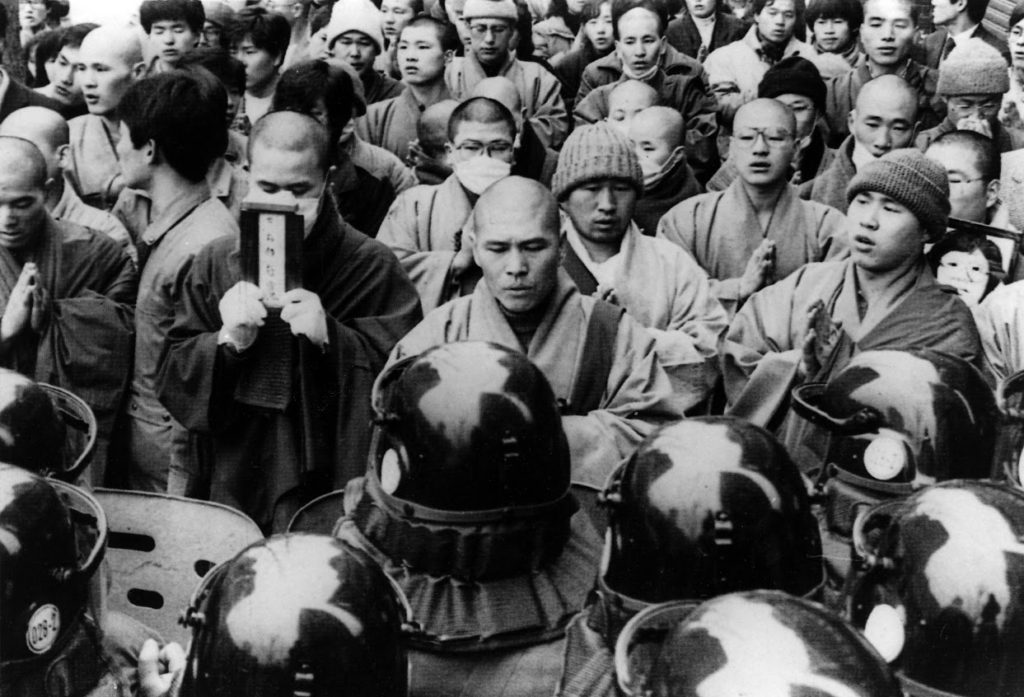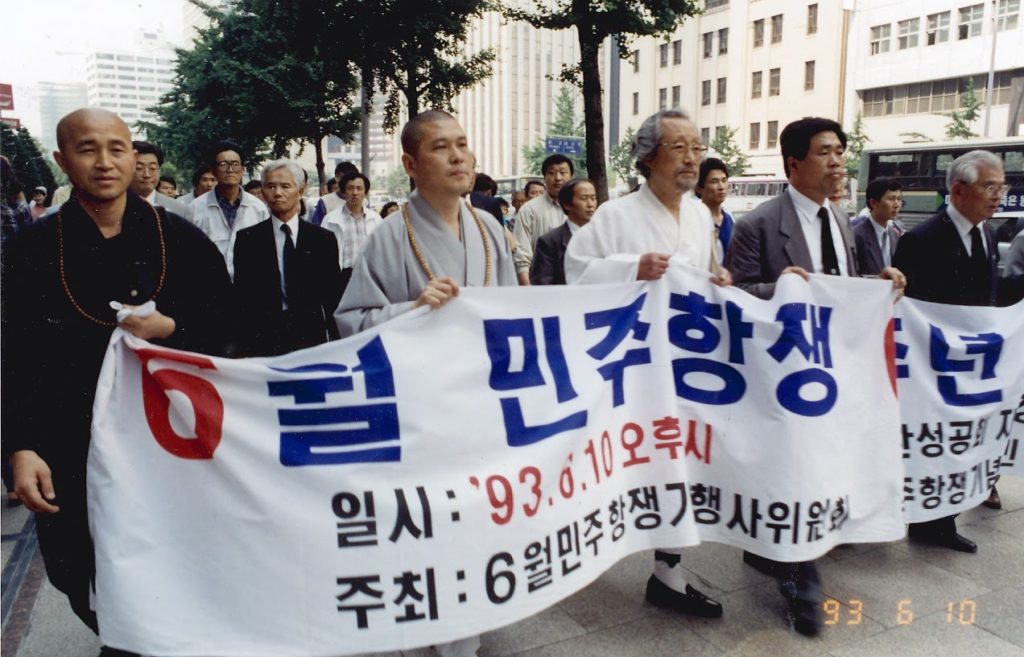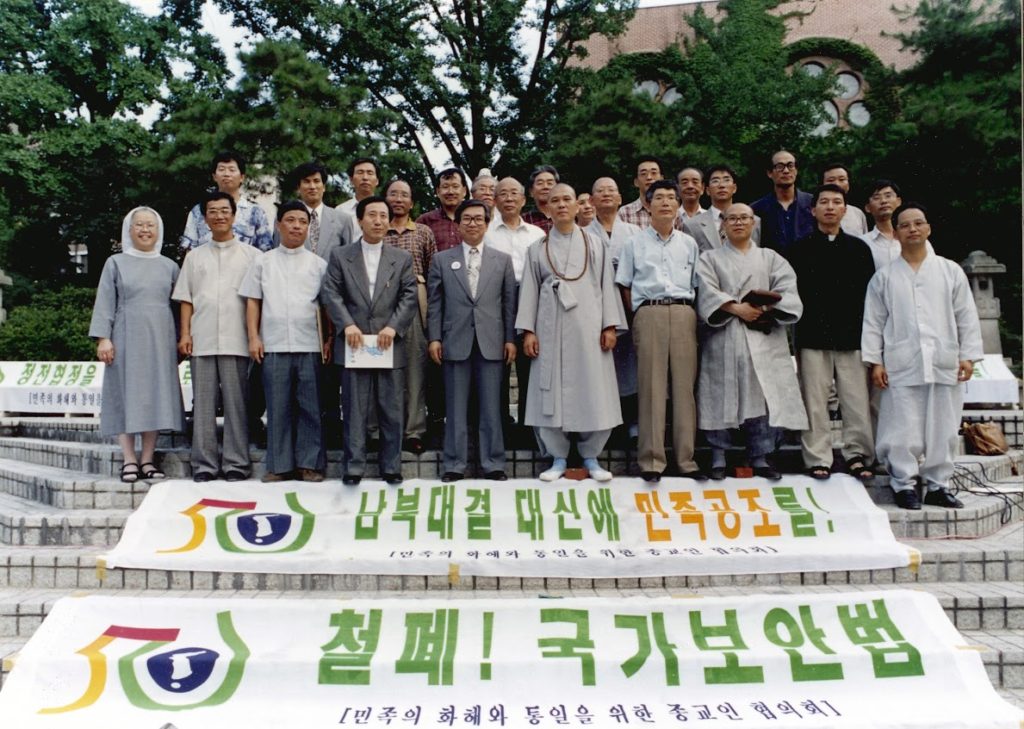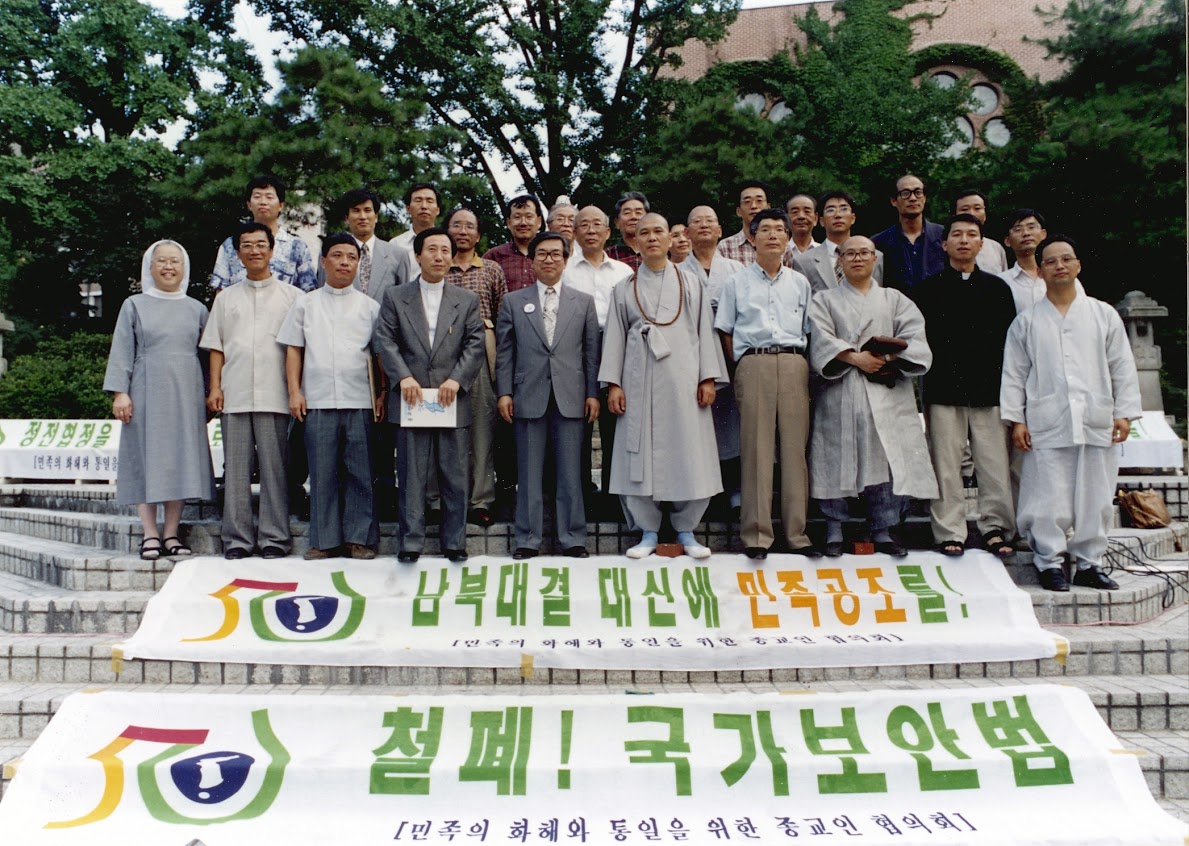Buddhist Master Ji Seon on Democracy: An Interview
Written by Monk Jang Gyong
The recent history of Gwangju is marked with selfless and often painful sacrifices for a brighter and more righteous future. The efforts of this city’s democratic movement were fueled by undaunted faith and, possibly, a somewhat idealistic hope for achieving freedom and equality. The voices from Chonnam National University and of Geumnam Street were heard not only throughout the nation; they echoed well beyond the borders of the country that was once referred to as the “Land of the Morning Calm.” The struggle for democracy and movements to achieve human rights are causes that can, indeed, resonate in the hearts of many people in the world.
Perhaps for Western people, even those who have lived for about a decade in this country, a comprehensive understanding of the history and culture of Korea can at times still pose challenges. However, when it comes to the relatively recent happenings related to the Gwangju Uprising and democratization, Westerners tend to have a sense of familiarity, a realization that we are standing on the same ground: The modern history of the Western world – whether it is that of the Americas, post-Soviet states, or Europe – is also marked, if not defined, by struggles of a similar kind.

Finding common historical ground is always an invaluable experience. Therefore, my excitement doubled when I was on my way to Baekyang Temple (aka, Baekyangsa) to meet Master Ji Seon (Korean title: Kunsunim, 큰스님) whose life and activities have strong links to Gwangju, and who currently serves as a spiritual director for Baekyang Temple and its branch temples. Master Ji Seon is well known in Gwangju as a person who has been a driving force in democratic and human rights movements, and as someone who still often uses a critical tone in addressing issues related to the May 18 Democratic Uprising and its aftermath. He has also raised a resolute voice for conducting the 2017 investigation, which resulted in an official apology in 2018 by the defense minister for the South Korean military’s role in suppressing the uprising.
I had the great fortune to incidentally meet Master Ji Seon for the first time at Gwaneum Temple, where he gave an encouraging talk at the invitation of Gwaneum Temple’s abbot So Un Sunim. Through this connection, I was able to have the following conversation at Baekyang Temple.
Jang Gyong (JG): Could you begin by telling us what you think when you look back at the Gwangju Democratic Uprising of 1980?
Master Ji Seon (Ji Seon): From the viewpoint of Buddhism and the social values it espouses, such a tragic uprising is not supposed to take place in a democratic state. Suppression by the ruling forces against Gwangju citizens was a barbarous act that should not have occurred in any democratic country. We must clarify and bring into the open problems that have arisen in the past, and reward or punish accordingly. If truth remains unrevealed, social conflict will continue.
JG: What is democracy from the Buddhist point of view?
Ji Seon: From the Buddhist point of view, democracy already exists in the Three Treasures of Buddhism: (a) Buddha (and the Buddha in one’s mind), (b) Dharma (the teachings), and (c) Sangha (the believers – those who follow the teachings). “Buddha” can be interpreted as “freedom,” “Dharma” as “equality,” and “Sangha” as “peace.” If you live according to the values of the Three Treasures, you can live a fulfilling, happy life.

Escaping from the restraints of someplace – for example, escaping from prison – can be called “freedom.” Freedom in Buddhism, though, means the eternal freedom gained by reaching Nirvana. I am not telling you that you should see the world from the Buddhist perspective. I am talking about how common people can practice the doctrine of Buddhism. It can be fulfilled through freedom, equality, and peace, just as democracy can be fulfilled in the same way.
In a democratic society, people’s freedoms can be guaranteed. These freedoms include freedom of the press, of expression, and of association. These freedoms are no different from the freedoms found in the Three Treasures. They bring about a harmony that can be found equally in all living beings. Just as we monks can become profound and pure, thanks to the teachings of the Buddha, so too can people become free, equal, and peaceful in a completely democratized society.
JG: Can you give some advice about democracy to Koreans and foreigners?
Ji Seon: Well, it is good to define democracy academically or logically, but I can define it more easily in my own mind. First, all life, all nations, and all people are equal. So, if people elect their desired leader and if they create the society that they wish for, it will be a real democracy. As such, democracy does not have to be interpreted intellectually.
JG: As a religious man, how can you find a balance between religious life and social activities?
Ji Seon: I have been participating in social activities for about 20 years. Sometimes, there was a conflict between the two. Buddhism has been thought of mainly as a religion of practice and society is a secular environment. A practitioner of religion lives outside of this environment. How can we join with society? And to what extent should we commit to doing it? We can truly feel that there are limitations.
How can one undertake personal salvation and social salvation at the same time? Korean Buddhism is of the Mahayana* school; however, it has not engaged itself much in social issues. As a rule, Buddhists do not actively participate in politics, and I have also received criticism for doing so.
However, I do believe that just focusing on one’s own practice, excluding others and their suffering is not right. Yet there is no clearly defined guide as to how a Buddhist should act in these circumstances. To me, though, Buddha’s teachings are oriented towards fulfilling the lives of all living beings.
All humanity should be aware of this and work to this end to help prevent the suffering of all sentient beings. Therefore, I believe that religious practicioners should also be engaged in social activities for relieveing the pain and suffering of others.
In a concrete way, this means that we should be one with our society, with our historical heritage and with our people. If this comes about, initial difficulties and conflicts will disappear, freeing us to practice our religion more deeply and more often. It is important to interpret the teachings and to live deeply in accordance with them – that is, in a manner more deeply than, say, as if it was a subject taught at school. In Mahayana Buddhism, this is referred to as the path of the Bodhisattva.

JG: In an interview a couple of years ago, you noted that “Korea looks as if it has undertaken a huge transition, but it has not.” Could you please explain this in more detail?
Ji Seon: Previous governments worked to develop industrial wealth, largely at the expense of democratic freedoms and liberties. Today, the trappings of democracy exist, but within society, the deep foundations of democracy have yet to come to pass.
Even when Kim Dae-jung and Roh Moo-hyun took over the leadership of civilian governments following popular elections, what these leaders achieved was very limited because of the deep-rooted authoritarianism found in Korean society, which is a result of the damage caused by events of the past.
Moreover, unjust laws such as the National Security Law, the Labor Law, and the Education Act are as they have always been, and are still inconveniencing people such as the poor, the working class, farmers, and fishermen.
The unification of Korea should be brought about forthwith. Korea has been a divided country since 1945. To bring about a thoroughly democratized nation, the country needs to be unified. Even though people shout out their own opinions in a kind of popular democracy, neither a democracy without unification, nor a unification without democracy, can come into existence.
In both South Korea and North Korea, limitations on assembly, plus various kinds of suppression and discrimination, are evidence of democracy not being realized at the political, economic, and social levels.
JG: Confucius said, “The father conceals the misconduct of the son, and the son conceals the misconduct of the father.” Following the moral laws of family relationships is honesty. What do you think about this statement from the democratic point of view?
Ji Seon: Well, I am not a Confucian scholar, but I have always thought that Confucius highly valued moral laws pertaining to family relationships.
Here, Confucius is saying that even if parents have faults, it is not right for children to report their parents to the authorities. Nor is it right for parents to report their children. By this, Confucius implies that it is a basic and naturally given moral ethic for family problems to be kept within the family. In this case, like the idiom “men are blind in their own cause,” hiding faults is moral because it obeys a moral law that governs family relationships.
Confucius is a sage who lays stress on moral laws. But in our present democratic society, this may not be most appropriate. When our parents commit a severe crime, we should not conceal it, even if they are our parents. Likewise, when our children commit a crime, we as parents should not conceal it either. I think Confucius might have placed too high a value on the moral laws that govern family relationships.
Original interview transcript by Jeong Ae-hwa
Translated by Lim Suyoung, Park Hanju, and Park Eun-hee
Photographs courtesy of Baekyang Temple
The Author
Monk Jang Gyong was born and raised in Budapest, Hungary. He learned about Korean Buddhism through the activities of the late Zen Master Sung Sahn. He came to Korea and became a monk in Seoul at Hwagye Temple in 2008 and has since been living and practicing as a Buddhist monk in temples throughout Korea. As for Gwangju, he practiced and lived at Gwaneum Temple between 2014 and 2017, and studied Korean language at Chonnam National University. Currently he resides at Buddha Zen Center, Busan.





